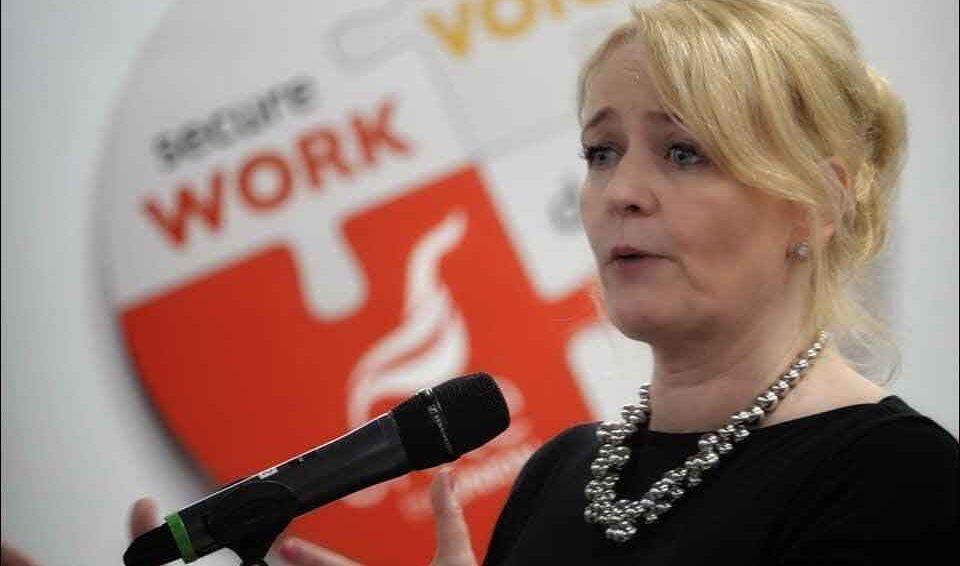

SHARON GRAHAM has won the closely-fought election to replace outgoing General Secretary Len McClsukey. With 46,696 votes (37.61%) Graham beat the official United Left candidate Steve Turner Turner (41,833, 33.69%), who was endorsed by McCluskey and Howard Beckett, and right-wing candidate Gerard Coyne (35,334, 28.46%).
Graham’s convincing margin of victory is a blow for Keir Starmer and the bosses who backed Coyne, and a victory for those inside Unite and the wider labour movement who recognise the need for a more combative approach to reverse decades of decline in workplace organisation, industrial militancy, and attacks on jobs, pay and conditions. The election of Unite’s first female leader of a union with an 80 per cent male membership will rightly be welcomed.
Unite is the Labour Party’s biggest affiliate and organises 1.4 million mostly private sector workers. With Keir Starmer leading a right-wing purge of socialists and bosses using ‘fire-and-rehire’ tactics to drive down pay and conditions, Graham’s election will have important ramifications across the political and industrial wings of the movement.
Divisions
The consequences of a right-wing takeover of a strategically important union at such a time raised the stakes—and divided the left. With no rank and file candidate, militants were faced with a choice between two wings of the union bureaucracy. We criticised the “beer-and-sandwiches” moderation of Turner, as well as the demagogic “workplace not Westminster” anti-politics of Graham. We decided on balance to endorse a vote for Turner, as the candidate best placed to stop Coyne.
That assessment has been proven wrong. Those of us who supported Turner on the basis of beating Coyne underestimated the support for Sharon Graham and overestimated the influence of the United Left’s electoral machine. Graham’s presentation of herself as an ‘outsider’ took votes from both United Left and Coyne. Her election is a clear rejection of the pro-business policy advocated by Coyne. But it is also a resounding rejection of the complacent business-as-usual campaign run by Turner and the United Left. United Left’s dominance of the union’s bureaucracy must now be in doubt.
Politics
This result shows that members have had enough of the status quo in the union leadership and endorsed Graham’s call for a “return to the workplace” and democratic reform of the union’s structures.
While Graham’s campaign made some positive gestures towards industrial militancy, it stopped short of promising the co-ordinated sector-wide action needed to stop the escalating attacks on conditions in transport, engineering and other industries.
Graham’s proposals to improve democracy through combines and other measures are welcome, but we must fight to ensure that these do not become stage-managed talking-shops dominated by the bureaucracy. This will mean breaking with the failed ‘Broad Left’ approach and building a democratic rank and file movement in Unite.
Particularly concerning was the strident anti-political tone of much of her campaign. While we need to rebuild workplace organisation—as well as organising entire new industries—we should reject the false binary between the ‘workplace’ and ‘politics’.
Any industrial strategy takes place in a political context shaped by the actions of the government, acting on behalf of the bosses as a class. Industrial action is one weapon in the workers’ arsenal. If we want to outlaw fire-and-rehire, stop the cut to Universal Credit, and repeal the anti-trade union laws; if we want to stop climate change, aid refugees, and oppose Britain’s foreign wars; then we will need a political organisation—a party—that can develop a strategy and provide leadership for the working class as a whole. In the class struggle politics is not an optional extra or a distraction; it is a vital terrain of struggle against the ruling class and their agents inside our movement.
Next steps
Nevertheless, Graham’s victory is a victory for the left across the movement. It mirrors the high score of Paul Holmes in the recent Unison general secretary election, which was followed by the left taking control of the NEC for the first time.
The victory over Coyne is a victory for Unite militants who would otherwise have faced a right-wing witch hunt linked to Starmer’s persecution of the left in the Labour Party.
Now we must campaign for Graham to implement every single one of the promises she made for industrial struggle and democratic reform.
We should engage in the proposed ‘combines’ and fight to ensure that these are real, democratic bodies that represent the rank-and-file of the union, and campaign to give them a fighting policy for the industry.
Instead of abstaining from the fight over Labour’s policy, we need to intensify it—but on a different basis. Unite is the largest affiliated union and members should democratically agree our attitude to the party and then fight for it in the constituencies, NEC and conference.
If Graham wants to lead a democracy drive from above, then rank and file activists should support that, while organising from below. Whatever the merits of any particular proposal, Graham’s reforms will have the union bureaucracy’s need to retain control over elections, disputes, and negotiations hardcoded into them.
To exploit the merits and overcome the limits of the new general secretary, to place the union on a fighting footing, we will need to organise a genuine rank and file movement, one that campaigns for members’ control over disputes, supervision of negotiations, and the dissolution of the bureaucracy by instituting regular election and recall of all officials.
That needs to happen under Graham’s leadership—and we can start by demanding the organising drive is launched immediately, under the control of members, and with all the resources necessary to succeed.